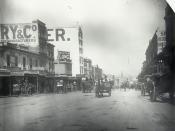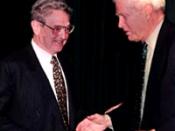George Soros
Everyone wants to be part of a get rich quick scheme. For most people, this never happens but for George Soros it happened almost overnight. Ever since he has made his quick fortune there has been a debate about whether it was strategy or just plain luck. My opinion is that it was a little bit of both.
Anyone who had invested $1,000 in George Soros' Quantum Fund when it jumped out of the box in 1969 would have realized a cumuluative 30-plus-percent annual return, or about $4 million, by the turn of the new century. He attributes his success to a combination of theory and instinct.
George's approach is the complete opposite of what most traders live by and this is that the market is always right. George Soros always assumes the market is wrong. He believes in "fallibility" of not only the market but the world as well.
Not only does he assume the markets are always wrong, but that his own ideas and predicted outcomes are flawed as well. In one his books he wrote that he actually got pleasure out of finding mistakes. He takes pride in recognizing his mistakes (Soros, 2006).
This discovery of a flaw, an error in his thinking, allows him to take whatever profits he had made from his flawed insight or cut losses. The difference between Soros and most other traders is that he accepts fallibility, so he starts out by assuming his hypothesis is wrong, rather than right like almost everyone else.
When most people find a flaw in an investment or trading thesis, they discard it. George Soros does the opposite. He plays it with greater confidence because he knows what is wrong with it while the market doesn't. He feels this puts him ahead of the...


